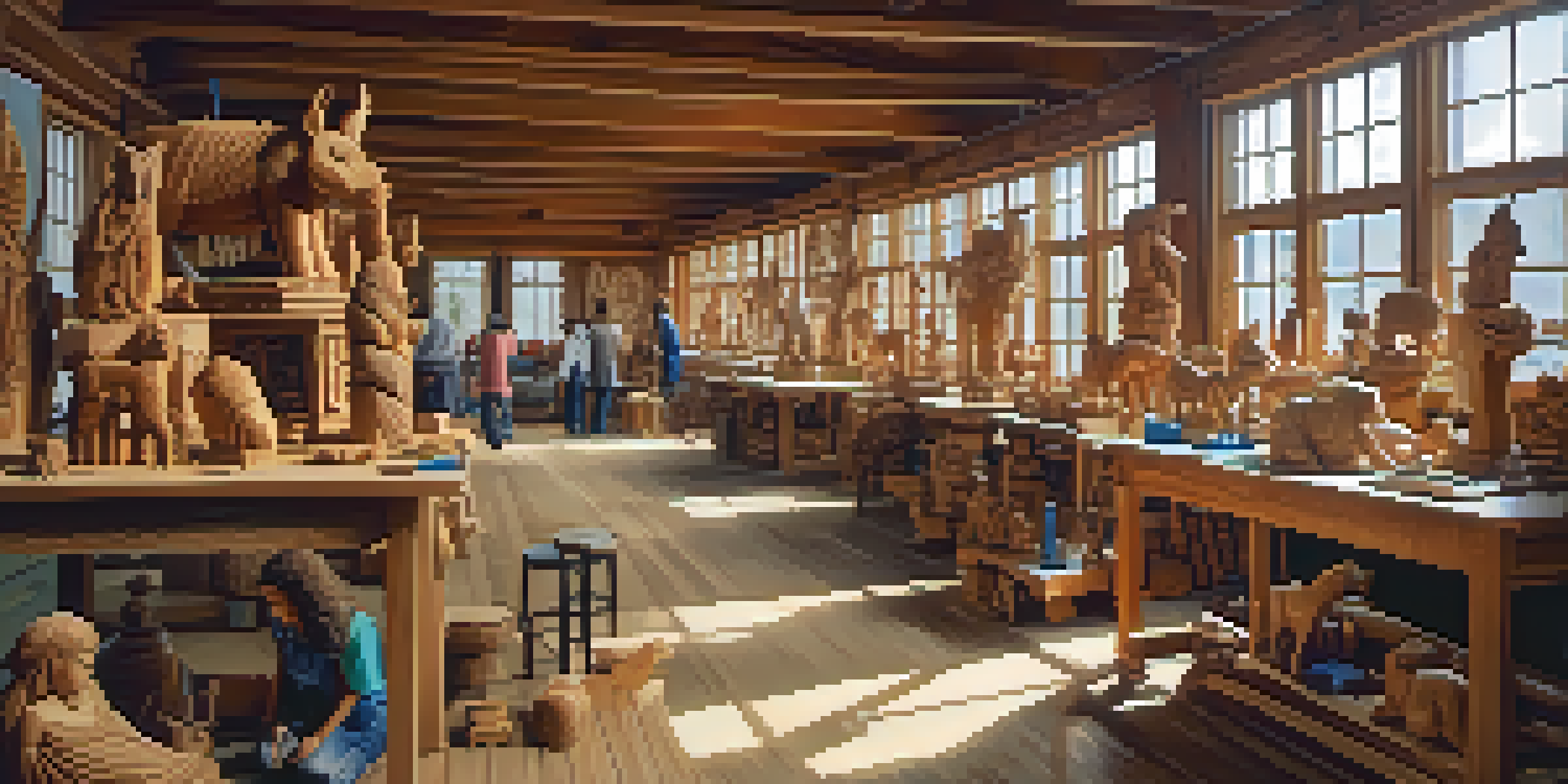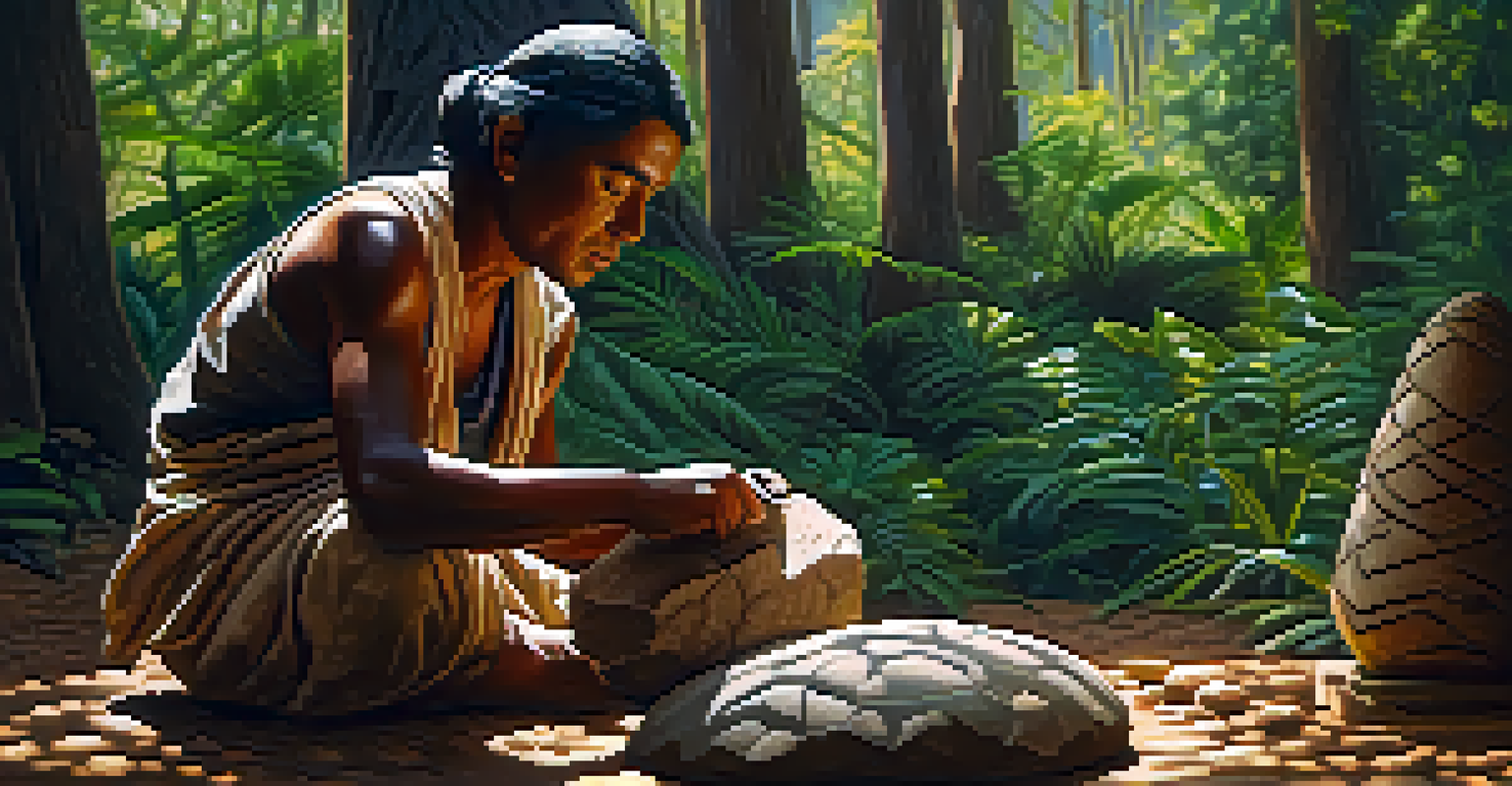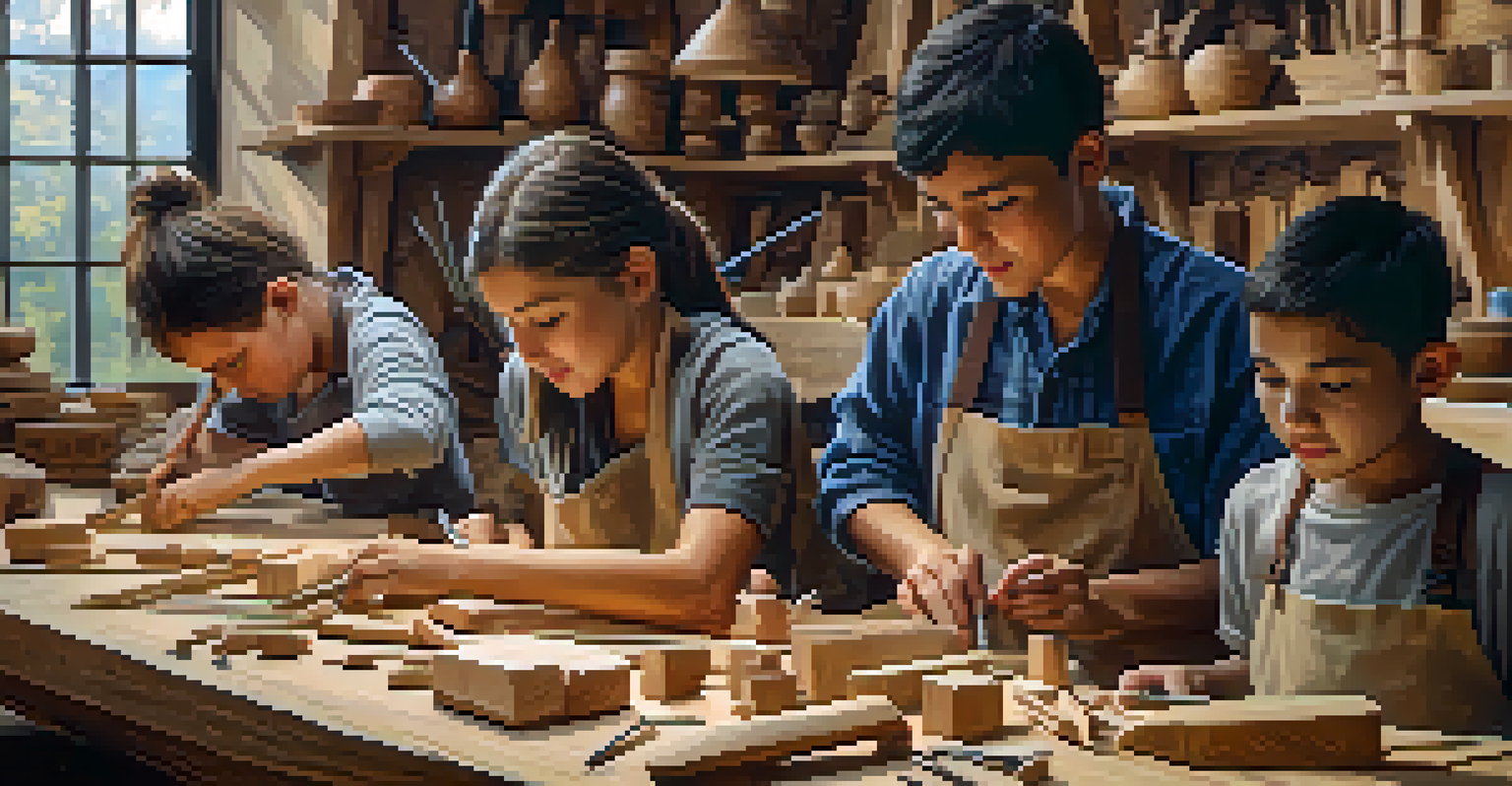The Global Impact of Carving Workshops on Local Cultures

Introduction to Carving Workshops and Their Importance
Carving workshops are more than just spaces for creating art; they are vital hubs of cultural expression. Across the globe, these workshops provide a platform for artisans to share their skills and traditions. By engaging in the craft, local communities can maintain their cultural heritage while connecting with a broader audience.
Art is not what you see, but what you make others see.
The act of carving itself is deeply rooted in history, often reflecting the unique stories and beliefs of a culture. Whether it’s wood, stone, or bone, the materials used carry significance, telling tales of the community’s past. This connection to history is what makes carving workshops essential in preserving local narratives.
Moreover, these workshops foster a sense of community, as artisans often collaborate and learn from each other. This collaboration not only enhances their skills but also strengthens cultural bonds, ensuring that traditions are passed down through generations. In this way, carving workshops serve as vital links between the past and present.
Economic Benefits of Carving Workshops to Local Communities
Beyond cultural significance, carving workshops can be powerful economic drivers for local communities. By attracting tourists and art enthusiasts, these workshops create opportunities for artisans to sell their work, generating income. This financial support can uplift entire communities, allowing for investment in local infrastructure and services.

Furthermore, carving workshops often promote sustainable practices by using locally sourced materials. This focus on sustainability not only preserves the environment but also creates a market for local suppliers. As artisans thrive, they can give back to their communities, further enhancing the local economy.
Cultural Preservation Through Carving
Carving workshops serve as essential platforms for maintaining and sharing cultural heritage within communities.
In essence, the economic impact of carving workshops extends far beyond the individual artisan. When communities invest in these workshops, they invest in their future, creating vibrant economies that celebrate and sustain their cultural identities.
Cultural Exchange Through International Carving Workshops
International carving workshops have emerged as platforms for cultural exchange, bringing together artisans from diverse backgrounds. These gatherings allow participants to share techniques, styles, and stories, enriching the global understanding of carving as an art form. The fusion of different traditions can lead to innovative creations that honor multiple cultures.
The greatest art is to sit, and wait, and listen to the stories the materials have to tell.
Through these workshops, artisans can also gain exposure to global markets, broadening their reach and influence. This exposure not only helps in selling their art but also in sharing their cultural narratives with a wider audience. Such interactions can spark appreciation and respect for different cultures, fostering a sense of global community.
Ultimately, international carving workshops highlight the beauty of diversity in art, as they encourage collaboration and creativity. By celebrating various artistic expressions, these workshops play a crucial role in nurturing cultural understanding and harmony.
Impact of Carving Workshops on Youth Engagement
Carving workshops often play a pivotal role in engaging youth within local communities. By providing hands-on learning experiences, these workshops can ignite a passion for artistry among younger generations. This engagement is crucial as it empowers youth to explore their creativity while connecting them with their cultural roots.
Moreover, participating in carving workshops can instill valuable life skills, such as patience and discipline. As young artisans learn to carve intricate designs, they develop a sense of accomplishment that boosts their confidence. This newfound self-esteem can inspire them to pursue other interests, fostering a well-rounded development.
Economic Growth via Artisanship
These workshops not only generate income for local artisans but also enhance community infrastructure and services.
Additionally, engaging youth in carving can help combat the loss of traditional skills. By involving them in the workshop process, older artisans can pass down their knowledge and techniques, ensuring that these valuable cultural practices endure. This mentorship creates a strong bond between generations, enriching both the youth and the community.
Preserving Indigenous Cultures Through Carving Workshops
Many indigenous cultures face the challenge of preserving their unique identities in a rapidly globalizing world. Carving workshops serve as crucial platforms for these communities to keep their traditions alive. By focusing on indigenous techniques and stories, artisans can educate others about their heritage and its significance.
These workshops can also play a role in reclaiming cultural narratives that may have been overshadowed by external influences. By emphasizing their art, indigenous communities can assert their identity and foster pride among their members. This reclamation of cultural expression is vital for maintaining a sense of belonging and community cohesion.
Furthermore, carving workshops often attract attention from outside, leading to increased awareness and appreciation of indigenous cultures. This visibility can help combat stereotypes and misconceptions, paving the way for greater respect and understanding. Ultimately, these workshops empower indigenous artisans to share their stories on their terms.
Environmental Awareness Promoted by Carving Workshops
In today's world, environmental awareness is more important than ever, and carving workshops can play a significant role in promoting sustainability. Many artisans are dedicated to using eco-friendly materials, often sourced from renewable resources. This sustainable approach not only protects the environment but also sets an example for others in the community.
Furthermore, workshops often emphasize traditional techniques that have minimal ecological impact. By teaching these methods, artisans foster a respect for nature and its resources among participants. This education can encourage a broader conversation about environmental stewardship in the community.
Youth Engagement and Skill Development
Involving youth in carving workshops fosters creativity, confidence, and the transfer of traditional skills across generations.
Additionally, the global attention on environmentally conscious practices can lead to collaborations with organizations focused on sustainability. As carving workshops gain recognition for their eco-friendly initiatives, they can inspire others to adopt similar practices, ultimately contributing to a healthier planet.
The Future of Carving Workshops and Cultural Sustainability
As we look to the future, the role of carving workshops in cultural sustainability will only grow. With the rise of digital platforms and global connectivity, artisans can reach wider audiences than ever before. This increased visibility can lead to more support for local cultures and their artistic expressions.
Moreover, the integration of technology into carving practices can bring new life to traditional techniques. By blending age-old methods with modern innovations, artisans can create unique pieces that resonate with both local and international audiences. This fusion not only preserves tradition but also keeps it relevant in today's fast-paced world.

Ultimately, carving workshops will continue to be vital cultural hubs, nurturing creativity and fostering community. By supporting these workshops, we contribute to a rich tapestry of global cultures, ensuring that their stories and traditions are celebrated for generations to come.